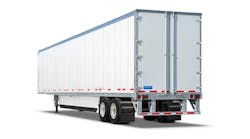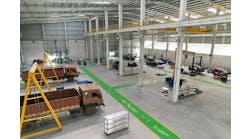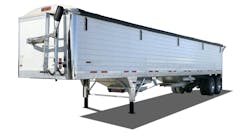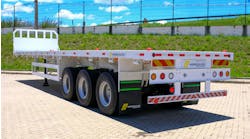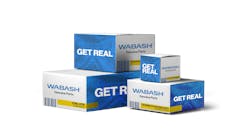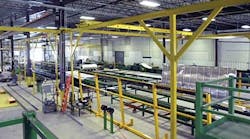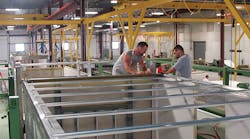Latest from Trailers
Tata launches Re.Wi.Re CV recycling program
Randon marks export milestone
Wabash expands parts network
Not every hybrid contains an engine and an electric motor. Take the newly “hybridized” Hackney and Kidron plant in Independence, Kansas, for example.
It's been almost a decade since two of America's venerable truck body manufacturing companies — Hackney and Kidron — became sister companies. During that time, Hackney plants built Hackney products, and Kidron plants built Kidron products. The two operations mostly shared ownership, rather than manufacturing space. Until now.
The VT Hackney plant in Independence, Kansas, is the first to house production of both — the beverage body and trailer line that Hackney builds and the refrigerated bodies that are the hallmark of Kidron.
But Kidron recognized the potential to use the Hackney facility as a manufacturing base for serving the Southwest, and expanded the Hackney plant by more than 50% in order to create space to manufacture refrigerated van bodies.
In making the move, it is now much closer to major population centers in Texas (now the nation's second-most populous state), along with Colorado, Missouri, and Oklahoma.
“We have a good sister company with a well-managed plant here in Independence, says John Sommer, executive vice-president. “It was a great place for us to invest.”
Hackney first opened the plant in 1972. Located on 28 acres, the facility consisted of 140,300 square feet of manufacturing and warehouse space, along with 6,600 square feet of offices.
To meet Kidron's manufacturing requirements, the company expanded the main assembly building with a 54,250-sq-ft addition. The chassis and final installation building was enlarged by 18,000-sq-ft.
The entire process took less than a year. The company broke ground June 14, 2011, and began limited production May 1.
“We hired a general contractor to build the building. But other than that, we did the entire project with existing staff,” says Kevin Spears, plant manager. “That includes either finding or building all of the fixtures. And we did it while taking care of the normal Hackney production — at a time when demand for Hackney beverage bodies was really beginning to balloon.”
Contributors to the project included Jason Scammey, engineer; Steve Potter, production manager; and Ron Hannigan, materials manager.
Getting ready
Construction for the expanded facility began July 1 last year. And while the building was being constructed, a group of Hackney employees went to Kidron headquarters in Ohio for training.
“We posted a notice to see if anyone would be interested,” Sears says. “We needed nine, and 20 people volunteered.”
The nine who were selected spent two months in training. Hackney in turn hired nine new people to replace the skilled personnel who transferred to the Kidron side of the plant.
Sears, a Hackney veteran, also spent time learning the Kidron product. He studied the company's plants in Kidron, Ohio, and Montgomery, Pennsylvania, in search of best practices that could be implemented in Independence.
The building was completed January 31. However, the plant was far from complete. Fixtures had to be installed, and some plans were changed as people had new ideas. Here is one example:
“Kansas is tornado country,” Sears says. “We are required to have a tornado shelter. As we looked at the heavy structural steel that we were using to build our elevated roofing station, it occurred to us that we could use the area beneath the roofing station as our tornado shelter. We put some heavy steel walls around the beams and now have a shelter that is far stronger than what we had planned. More than 70 people can gather beneath our roofing station in the event of a tornado.”
Significant differences
Refrigerated van bodies and beverage bodies are two different products with major differences in the way they are manufactured. For example, most of the welding is done on the floors of refrigerated bodies. Beverage bodies, however, involve a significant amount of welding throughout. They also require a fair amount of fabrication — including major alterations to the chassis frame rails.
For refrigerated vans, insulation quality is key. It is primarily an assembly process with very limited fabrication required. Generally, the bodies are mounted with no significant alterations required on the chassis.
“We alter frames every day,” Sears says. “So if we get a chassis for a Kidron order that needs alteration, we are ready to do it. We know exactly what's required.”
Even the basic material flow is different for the two product lines. Hackney beverage bodies have been and will continue to be stall-built. The plant has six assembly stations where Hackney products are produced. By contrast, Kidron uses a cellular manufacturing approach to produce subassemblies that are fed into an assembly line.
Ramping up production
Kidron is only in the first few weeks of production at the Independence plant.
“We have a good backlog,” Sears says. “By the end of 2012, we expect to be building 15 bodies a week, and we will be pushing for more.”
The additional production is well within what the plant is designed to be able to build. When at top speed, the plant should be able to produce seven bodies a day — 35 per week — on a single shift.
“We have an experienced workforce here,” Sears says. “Our average employee has 17 years experience with us.”
A lengthy history
Much like the people who work there, Kidron and Hackney have been serving their respective markets for many years. Hackney, based in Washington, North Carolina, has been specializing in beverage bodies and trailers for more than 60 years. Beyond that, the Hackney family traces its roots back to England where it built four-wheeled horse-drawn carriages known as Hackney coaches. The first know coach of this type was built in 1619.
Kidron also started as a family business. Two of the three generations of the Sommer family continue to work there.
The two companies are now owned by VT Systems (VTS) is an integrated engineering group serving the aerospace, electronics, land systems, and marine sectors. VTS has 5,100 employees worldwide.



